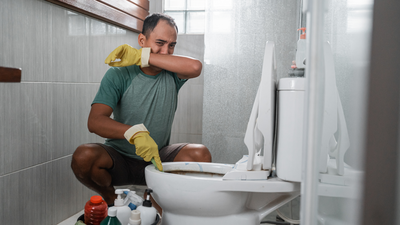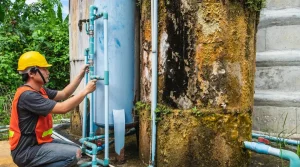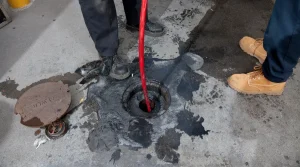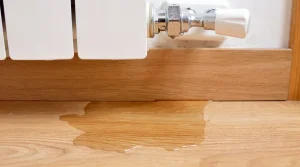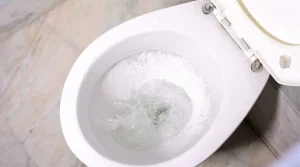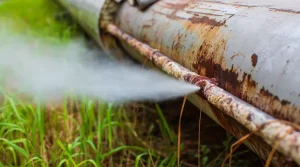Key Takeaways:
- Broken or Damaged Sewer Line: A damaged sewer line can cause foul sewage odors and pose health risks. Common causes include tree roots, soil shifting, and clogs. This issue requires professional repair.
- Dirty or Clogged Garbage Disposal: Food buildup in the garbage disposal can lead to bad smells. Regular cleaning using baking soda, vinegar, and citrus peels helps prevent odors.
- Dry P-Trap: A dry p-trap allows sewer gases to escape. Fix by running water through unused drains regularly or adding a small amount of vegetable oil to slow evaporation.
- Bacterial Biofilm Build-Up: Bacterial growth in drains, caused by soap scum and oils, can create unpleasant odors. Clean regularly with baking soda, vinegar, and hot water to prevent biofilm.
Common Causes of Smelly Plumbing
There are several reasons why your plumbing might start to smell. While some may be fixed rather easily, others would need the help of a professional. Here are four of the most common culprits behind smelly plumbing:
A Broken or Damaged Sewer Line
Sewer lines that are damaged or broken are among the most severe plumbing causes smells. Your home’s sewer line carries wastewater from your house and into the municipal sewer system. If this line becomes damaged, it can lead to leaks, allowing sewage to seep into the ground around your home—or even back up into your plumbing. The unmistakable smell of sewage is unpleasant and can pose health hazards if left unaddressed.
Causes of Sewer Line Damage Plumbing Smelly
There are several ways a sewer line can become damaged. Here are a few common ones:
- Tree roots: Tree roots may encroach on your sewer line over time, causing blockages or cracks.
- Soil-shifting: Changes in the soil around your home, such as erosion or settling, can cause the sewer line to shift, resulting in cracks or breaks.
Clogs: A clog in the sewer line can create excessive pressure, causing the pipe to burst.
Signs of a Damaged Sewer Line
Aside from the unpleasant smell of sewage, here are some additional warning signs of a damaged sewer line:
- Frequent clogs: If your toilets, sinks, or bathtubs constantly clog, it may indicate a more significant issue in the sewer line.
- Gurgling sounds: Gurgling noises from your drains could indicate a clog or damage in the sewer line.
- Pest problems: Rats, insects, and other pests may be attracted to sewage leaks, leading to infestations in and around your home.
Solution
Unfortunately, fixing a broken sewer line is not a DIY job. You’ll need to call a professional plumber who is able to evaluate the damage and suggest the best action. Sometimes, the plumber must dig up the sewer line and replace the damaged section. Alternatively, they could perform a trenchless repair, which is less invasive and more cost-effective.
Dirty or Clogged Garbage Disposal
If you have a garbage disposal, it’s essential to keep it clean. Food waste can accumulate within the disposal over time, resulting in clogs and unpleasant odors. While garbage disposals are significant for removing small food scraps, they’re not invincible. If you don’t regularly clean and maintain your disposal, it can turn into a bacterial haven. leading to foul smells.
How to Clean Your Garbage Disposal
Fortunately, cleaning your garbage disposal is relatively simple. Here’s a step-by-step guide:
1. Turn off the disposal: Ensure the disposal is turned off and unplugged, if possible, before cleaning.
2. Clean the splash guard: The splash guard, the rubber flange inside the drain, can harbor food particles. Use a brush or sponge with soap and water to clean it thoroughly.
3. Use baking soda and vinegar: Transfer a half-cup of baking soda and a cup of water into the garbage disposal vinegar. Let the mixture sit for a few minutes to break down any food residue.
4. Rinse with hot water: Once the combination of vinegar and baking soda has had time to work, run hot water through the disposal to flush it out.
5. Grind ice and citrus peels: To freshen things up, throw a few ice cubes and citrus peels, such those from oranges or lemons, into the disposal and run them for a few seconds. The blades will be cleaned by the ice and the citrus peels leave a pleasant scent.
Preventing Future Odors in Plumbing
Avoid pouring a large amount of food waste into the toilet to keep your fresh fragrance trash disposal. immediately, and refrain from disposing of grease, oils, or fibrous foods (like celery or potato peels), which can clog the disposal. Regularly cleaning the disposal with baking soda, vinegar, and ice will also help prevent odors from returning.
Dry P-Trap
The curved segment of pipe beneath your toilet is called the p-trap. sinks and other plumbing fixtures. Its purpose is to hold a little quantity of water that serves as a barrier to stop sewer gasses from coming up through the drain. If the p-trap dries out, those gases can escape, creating an unpleasant smell in your home.
Why Does the P-Trap Dry Out?
A dry p-trap is usually the result of infrequent use. For example, if you have a guest bathroom or a sink you rarely use, the water in the p-trap may evaporate over time, allowing sewer gases to rise through the drain.
Solution
A dry P-trap may be easily fixed by just pouring water down the drain! In the event that your shower, toilet, or sink aren’t used very often, make a habit of running water through it every few weeks to ensure the P-trap stays filled. This will keep sewer gases from escaping and causing unpleasant odors.
Long-Term Prevention
To prevent dry p-traps in rarely used fixtures, Think about adding a tiny bit of vegetable oil to the drain after running water. The oil will float on top of the water in the p-trap, slowing evaporation and keeping the trap moist for longer.
Bacterial Biofilm Build-Up
If you smell something bad coming from your shower drain, the culprit could be bacterial Biofilm. Biofilm is a slimy substance of bacteria that can accumulate in drains over time. It often results from the build-up of soap scum, shampoo, oils, and other residues, which provide a food source for bacteria. As the bacteria feed on the Biofilm, they produce unpleasant odors that can waft from the drain.
Ready to tackle that clogged drain? Learn how to use a plumber’s snake like a pro and restore your pipes to perfect working order. Click here for a step-by-step guide and get your drain flowing smoothly again
How to Remove Biofilm
Cleaning out Biofilm is straightforward, but it requires a bit of elbow grease. Here’s how you can get rid of the smelly substance:
1. Remove the drain cover: If your drain has a cover, unscrew or pop it off to gain access to the drain opening.
2. Clean the drain opening: Use an old toothbrush or scrub brush with soap and water to clean the inside of the drain. Be sure to scrub away any visible grime or biofilm build-up.
3. Flush with hot water: Boil a few liters of water and pour it down the drain to help break up any remaining biofilm.
4. Use baking soda and vinegar:After flushing with hot water, use a combination of baking soda and vinegar. Pour half a cup of vinegar and a cup of baking soda down the drain. Allow the blend to settle for at least an hour.
5. Flush again: After baking, soda and vinegar have had time to work, flush the drain with hot water.
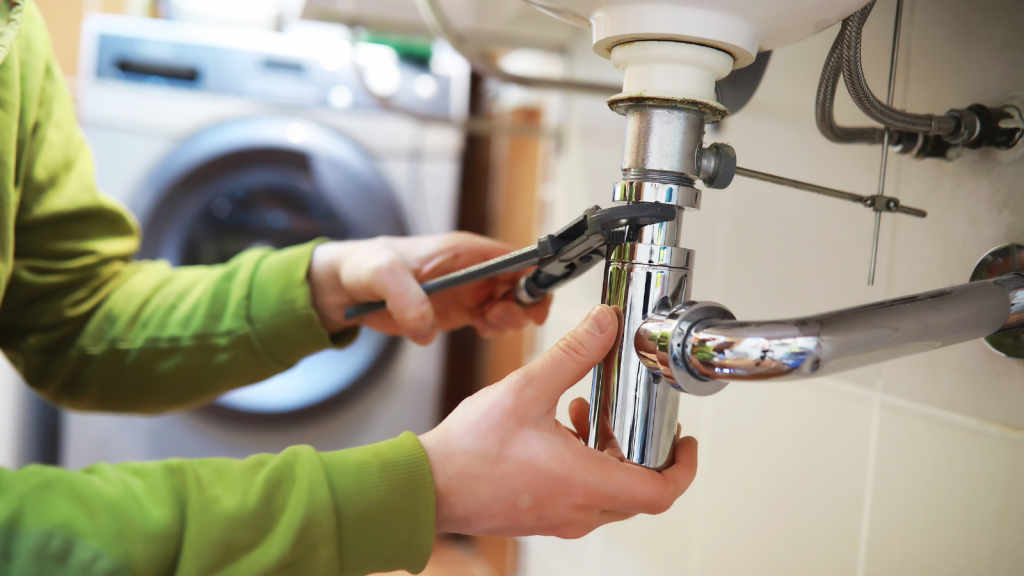
Preventing Future Biofilm Build-Up
To prevent Biofilm from returning, regularly clean your shower drain and avoid allowing soap scum and hair to build up. A drain cover or hair catcher can also help prevent clogs and biofilm accumulation.
- Other Potential Causes: While the four causes outlined above are the most common, there are other reasons your plumbing might be smelling. These include:
- Blocked vent pipes: Vent pipes allow sewer gases to escape your home. If a vent pipe becomes blocked, the gases can back up into your plumbing system, leading to foul odors.
- Mold growth: In moist environments, mold may develop. including inside pipes. If you notice a musty smell coming from your plumbing, it could be due to mold growth.
- Water contamination: In rare cases, smelly plumbing could be caused by contaminated water. If you suspect this, contact a professional to test your water supply.
When to Call a Plumber
While some plumbing odors can be addressed with DIY methods, others require the help of a professional. If you’re dealing with a persistent smell you can’t seem to get rid of, or if you suspect a more serious issue like a broken sewer line, don’t hesitate to call a licensed plumber. They can diagnose the problem and recommend the best action to get your plumbing back in good working order.
Final Thoughts
Smelly plumbing is unpleasant and can also indicate a more severe problem. By understanding the common causes of plumbing odors and taking steps to prevent them, you can keep your home fresh and free from foul smells. Whether a simple fix like cleaning your garbage disposal or a more complex issue like a damaged sewer line, addressing plumbing odors early can save you time, money, and frustration in the long run.
Odor-Free Plumbing for a Cleaner, Fresher Home!
If your plumbing has a rotten egg smell, it’s time to take action. Most plumbing odors can be fixed quickly and easily. For more complex issues, trust the experts at BJC Plumbers North Bergen. Our team is ready to tackle any stinky problem, leaving your plumbing—and your home—smelling fresh.

